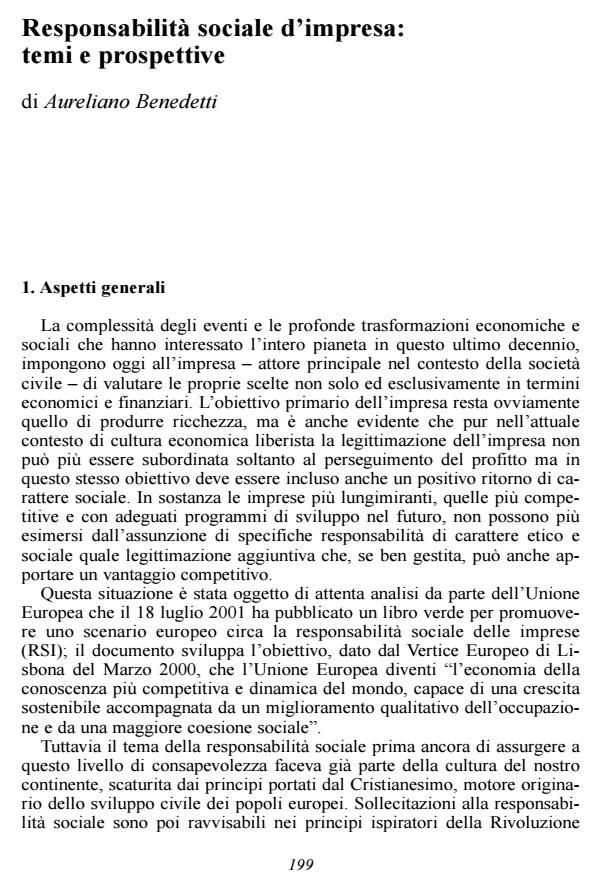Responsabilità sociale d'impresa: temi e prospettive
Titolo Rivista SOCIOLOGIA DEL LAVORO
Autori/Curatori Aureliano Benedetti
Anno di pubblicazione 2004 Fascicolo 2004/96
Lingua Italiano Numero pagine 6 P. Dimensione file 15 KB
DOI
Il DOI è il codice a barre della proprietà intellettuale: per saperne di più
clicca qui
Qui sotto puoi vedere in anteprima la prima pagina di questo articolo.
Se questo articolo ti interessa, lo puoi acquistare (e scaricare in formato pdf) seguendo le facili indicazioni per acquistare il download credit. Acquista Download Credits per scaricare questo Articolo in formato PDF

FrancoAngeli è membro della Publishers International Linking Association, Inc (PILA), associazione indipendente e non profit per facilitare (attraverso i servizi tecnologici implementati da CrossRef.org) l’accesso degli studiosi ai contenuti digitali nelle pubblicazioni professionali e scientifiche.
Social Corporate Responsibility: themes and prospects ABSTRACT: The deep-rooted and complex economic and social transformations that have characterized our planet in the last decade have forced companies, as the leading actors in civil society, to evaluate their choices beyond an exclusively economic and financial point of view. In the context of the global development of capitalism, where the sole arbiter of the situation is the market, there is at last a full realization of the necessity to draw business peoples’ attention to their social responsibilities, and above all to place companies in a new context of relations and values with respect to the area where they work. Naturally banks are not exempt from all this. As credit agencies they simply cannot function without taking into consideration the principles and values that are strictly linked to Social Corporate Responsibility. The savings banks sector has always, from the beginning, addressed the issue of social responsibility: by providing incentives to create saving as a presupposition for well-being. From there began the building of social values which reflect the historical role that savings banks have played in society and in local development. It’s clear that Social Corporate Responsibility must be at the basis of the economic behaviour of bank and companies, but it’s also essential not to force on businesses conditions which do not take into consideration the specific geographic and economic circumstances of the area where they work. There is a very strong element of subjectiveness in the definition of socially responsibile behaviour. At this point it must also be emphasized that small and medium-sized companies cannot be excluded from all this because they represent the keystone of our country’s economy. The aim must be for the involvement of a diversity of people who work in the area in question: a culture of social corporate responsibility cannot exist without the widespread involvement of the business community. A final consideration: we currently live in a climate of fast economic development, ever-increasing interdependence among companies and a culture that tends to ascribe responsibility to the law, or at least to collective organizations. All of this leaves individual responsibility too much to one side. On this note it is important not to forget that the categorical imperatives and the abstract definitions of ethical values must bow down before the individual’s sense of moral and civil responsibility, because at the end of the day it is still the individual, protagonist of history, who chooses his or her future and in this way conditions the world.
Aureliano Benedetti, Responsabilità sociale d'impresa: temi e prospettive in "SOCIOLOGIA DEL LAVORO " 96/2004, pp , DOI: